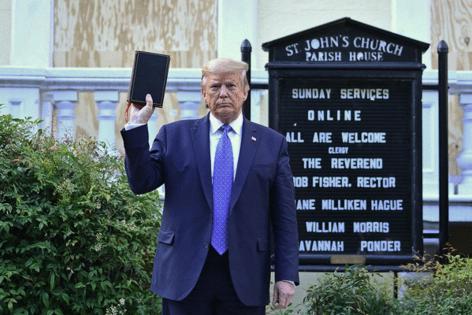Commentary: Evangelical Christians' long road to Donald Trump
Published in Political News
We don’t yet know the precise numbers, but it appears once again that four out of five white evangelicals voted for Donald Trump in the presidential election.
Evangelical support was by no means decisive; a similar percentage voted for Trump when he lost in 2020. But when a supermajority of a group that comprises approximately 25% of the population falls into your column, that’s a pretty good foundation upon which to build a winning coalition.
Trump promised to be their protector against a range of supposed enemies, to advance white evangelical fever dreams of Christian nationalism. Until he realized that the recission of Roe vs. Wade was unpopular with a majority of Americans, Trump crowed about having appointed justices who did exactly that.
Still, the anomaly of a movement that professes allegiance to “family values” supporting a thrice-married, self-confessed sexual predator, not to mention a convicted felon, cannot be ignored.
But 2024, let alone 2016 or 2020, was not the first time white evangelicals shoved aside their putative values to support a presidential candidate.
In the late 1970s, divorce was considered taboo in evangelical circles, especially divorce and remarriage. Anyone in that category would very likely lose membership in his or her church. Nevertheless, evangelicals, led by Jerry Falwell and other leaders of the religious right, chose to anoint the divorced and remarried Ronald Reagan as their political messiah in 1980. Worse, as governor of California back in 1967, Reagan had signed the most liberal abortion bill in the country, adding to the puzzle.
So why would evangelicals forsake one of their own, Jimmy Carter, a born-again Christian Sunday school teacher and family man, in favor of Reagan?
The answer is not pretty — and it’s the same reason that helps to explain white evangelical support for Trump: racism.
Contrary to the religious right’s own narrative, white evangelicals did not organize politically in the 1970s in opposition to Roe v. Wade. The Southern Baptist Convention, in fact, passed a resolution in 1971 calling for the legalization of abortion, a resolution they reaffirmed in 1974 and again in 1976. Evangelicals overwhelmingly considered abortion a Catholic issue throughout the 1970s, and the few evangelicals who commented on the Roe decision applauded it as marking an appropriate distinction between personal morality and public policy.
So what did mobilize evangelicals politically? The catalyst, according to historical records as well as the testimony of such conservative leaders as Paul Weyrich, cofounder of the Moral Majority; Richard Viguerie, Christian right direct-mail king; and Grover Norquist, antitax hound, was the defense of racial segregation at evangelical “segregation academies” and institutions, including Bob Jones University in South Carolina.
Falwell, who by his own admission did not preach his first antiabortion sermon until Feb. 26, 1978, more than five years after the Roe decision, had founded his own segregation academy in 1967. Having famously decried the civil rights movement as “civil wrongs,” he was incensed that the Internal Revenue Service might rescind his tax exemption because of racial segregation and complained that in some places it was easier to open a massage parlor than a “Christian” school.
Reagan, like Trump decades later, was their man to stand up to the nefarious forces seeking to destroy what they were selling as evangelicalism.
Reagan had opposed the Rumford Fair Housing Act in California, which banned discrimination in the purchase and rental of housing. He was an outspoken opponent of the Civil Rights Act of 1964 and the Voting Rights Act of 1965. His campaigns were littered with racist dog whistles, especially “law and order” and “welfare queens.” He opened his 1980 general election campaign for the presidency in Neshoba County, Mississippi, declaring his support for “states’ rights” in the place where in 1964 three civil rights workers were abducted, tortured and murdered by members of the Ku Klux Klan in collusion with the local sheriff’s office.
President Reagan would go on to sign the federal Fair Housing Amendments Act of 1988, but that didn’t stop him from decimating the Civil Rights Commission or from maintaining his support— by opposing sanctions — for the apartheid government in South Africa, even as the regime was collapsing beneath its own weight.
White evangelicals did not shy away from Reagan and his racist rhetoric or policies. They lionized him.
And so too with Trump. The bigoted “birther” nonsense directed against President Barack Obama, the nation’s first Black president, in itself should have prompted white evangelical leaders to sound the alarm against him, not to mention Trump’s recognition of “some very fine people” at a white supremacist rally or the torrent of insults directed against African Americans, especially Black women, and immigrants. Instead, they have enthusiastically supported Trump in all three of his campaigns for the White House.
Does that mean that every “Bible-believing” Christian who voted for Trump is racist? No, not at all. But there’s a link between the origins of the religious right in defense of racial segregation and the overwhelming white evangelical support for a candidate who traffics in racialized rhetoric.
That link includes Reagan, but it also encompasses minor characters like Roy Moore, former chief justice of the Alabama Supreme Court, who declared that America was great during slavery because “families were united.” It includes Tony Perkins of the Family Research Council and his history of interactions with the Ku Klux Klan and the Council of Conservative Citizens, also known as the “uptown Klan.”
The racism infecting the religious right extends back to its formation in the late 1970s. And because unrepented racism tends to fester, the 2024 election demonstrated once again that white evangelicals have yet to acknowledge or repent of the persistent racism that animates their politics.
____
Randall Balmer, author of “Bad Faith: Race and the Rise of the Religious Right,” teaches at Dartmouth College.
©2024 Los Angeles Times. Visit at latimes.com. Distributed by Tribune Content Agency, LLC.




























































Comments